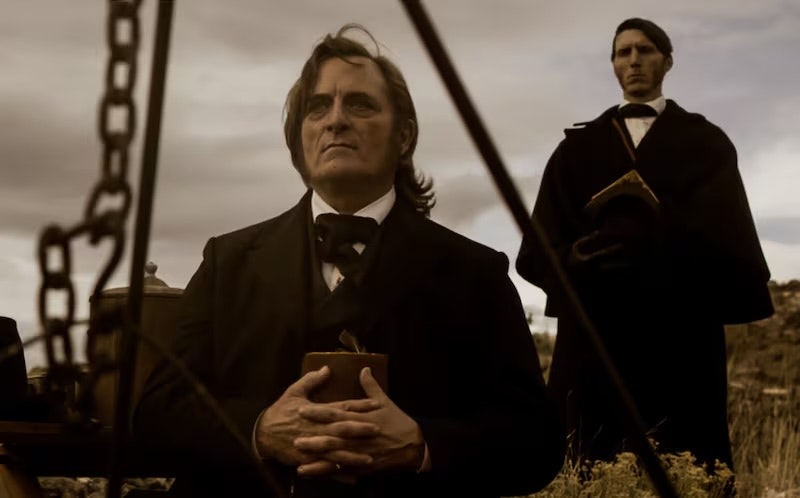The western has never disappeared from popular culture, but more traditionalistic interpretations of the genre have faded in favor of what it has inspired. Nearly every significant franchise protagonist of the last several decades has the same roots as the gunslingers of Hollywood’s Golden Age of Westerns; Indiana Jones, John Wick, Jack Reacher, and Jason Bourne retain the same blend of stoicism and integrity that defined John Wayne or Glenn Ford. That said, there has been some hesitation in making modern films and television set directly in America’s frontier era due to the bleak historical details. It’s accepted that the real “wild west” wasn’t just adventure and heroism, but even revisionist works like Clint Eastwood’s Unforgiven or Robert Altman’s McCabe & Mrs. Miller are still lionized.
Concerns about historical sensitivity have never been an issue for Peter Berg. Berg is an eclectic writer, director, and producer who’s quietly become the lynchpin of gritty, grounded character dramas that aren’t afraid to appease a right-wing audience. Although Berg started off his career with the open-hearted honesty of Friday Night Lights and Wonderland, he steadily transitioned into more maximalist blockbusters like Battleship and The Rundown. Berg never felt entirely comfortable as a studio’s hired hand, as it was evident that projects like Hancock only appealed to him if he was able to filter in his signature sense of black comedy and masculine wish fulfillment. He was able to bend history to his will by taking stories traditionally reserved for “Oscar bait” and turned them into genre fare; Lone Survivor is a survival thriller that draws loose inspiration from a true story, Deepwater Horizon turned the infamous 2010 oil spill into the premise of a disaster film, and Patriot’s Day used the framework of the Boston Marathon Bombing to stage a manhunt adventure.
Berg’s unification of historical tragedy and raw pathos has placed him in a rare creative space between mainstream and prestige, so it’s not surprising that he’d eventually work within the most iconic of American genres. Berg’s six-part miniseries American Primeval may not have served as a reunion with Mark Wahlberg (who starred in his last five films), but it did offer a comeback role for Friday Night Lights star Taylor Kitsch. Kitsch was cast in the lead role of Isaac Reed, a lonesome drifter who has made a living as a guide amidst the westward expansion of the 1850s. Reed’s employed by the outspoken mother Sara Rowell (Betty Gilpin) and her young son Devin (Preston Mota), who are determined to reach their destination amidst the Utah War.
The Mountain Meadows Massacre occurred when extremists from the Church of Latter Day Saints staged a violent attack on settlers who traveled by wagon train. American Primeval point its finger at religious radicalism as an unfortunate side effect of Manifest Destiny, as Sons of Anarchy star Kim Coates makes a disturbed appearance as the Mormon Church’s second president, Brigham Young. Young’s ability to hijack scripture to justify conducting a massacre would feel like a caricature in most other historical dramas, but American Primeval takes sick pleasure in the depiction of what unearthed evil existed in the frontier. Among the most memorable villains are Jai Courtney as the caustic fur trapper Virgil Cutter, and Joe Tippet as the ruthless Mormon militia leader James Wosley.
Berg’s never been a storyteller interested in diversity for the sake of appeasement, but his recognition of shared trauma is perhaps why his depiction of the American dream has been so resonant. Friday Night Lights had many storylines dedicated to race, but the show found unity among its high school characters, as they were all small town dreamers with only one opportunity to reach their peak. In American Primeval, Berg has conflated the American identity with one of persecution and tragedy. This includes the orphaned indigenous girl Two Moons (Shawnee Pourier), who’s rescued by Devin after a massacre has decimated her tribe; however, it also incorporates Jacob Pratt (Dane DeHaan), a Mormon deceived into the belief that his wife was captured by a Native-American tribe.
American Primeval is violent to an absurd degree, as Berg’s keen to ensure that nothing about his grandiose epic feels romanticized. The series’ first installment includes a bloody siege in which many Mormon attackers have disguised themselves as Indigenous soldiers. Although the show is somewhat interested in how this factored into the gross mischaracterization of Indigenous culture within the western genre, it has spared no expense in its portrayal of tragedy.
Despite the overt attempt American Primeval makes to reject the roots of the western genre’s look and feel, it embodies similar characteristics when it comes to the notion of a found family. It’s evident from the moment he’s emerged from a secluded backdrop that Isaac will serve as a paternal figure to Devin, who has rejected the discriminatory practices that surround him through his compassion for Two Moons.
Although a scene-stealing performance by the great Shea Whigham as the wilderness trapper Jim Bridger is more nuanced in its examination of leadership, a majority of American Primeval is lifted from classical storytelling. Perhaps this was Berg’s attempt to offer some narrative thrust to a series that has no takeaways from the past, other than an acknowledgment that survival was itself an act of sacrifice.

